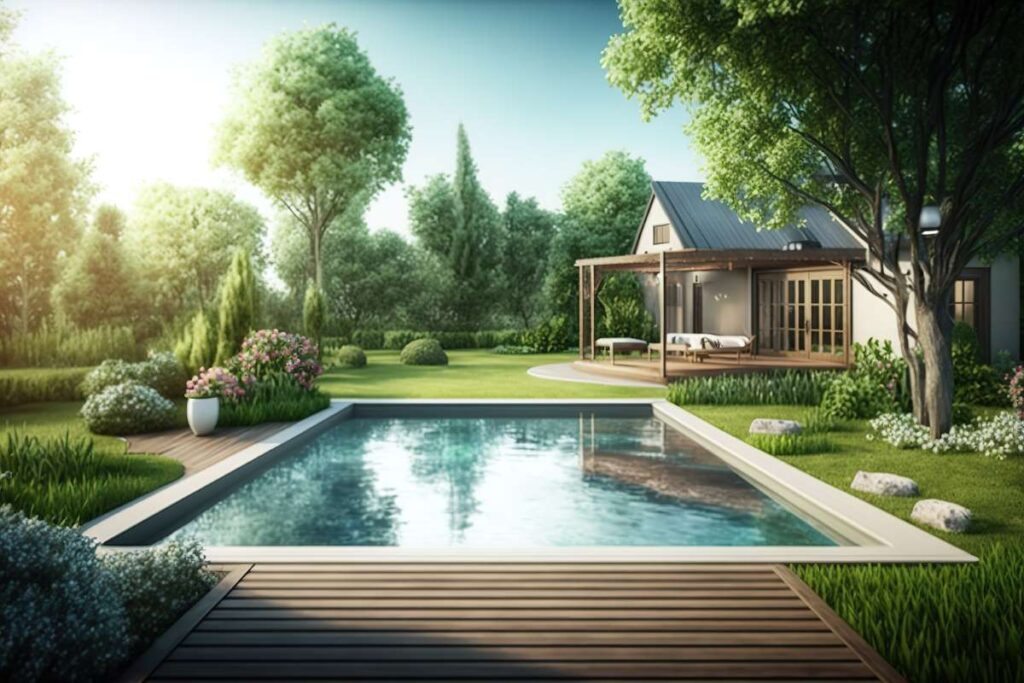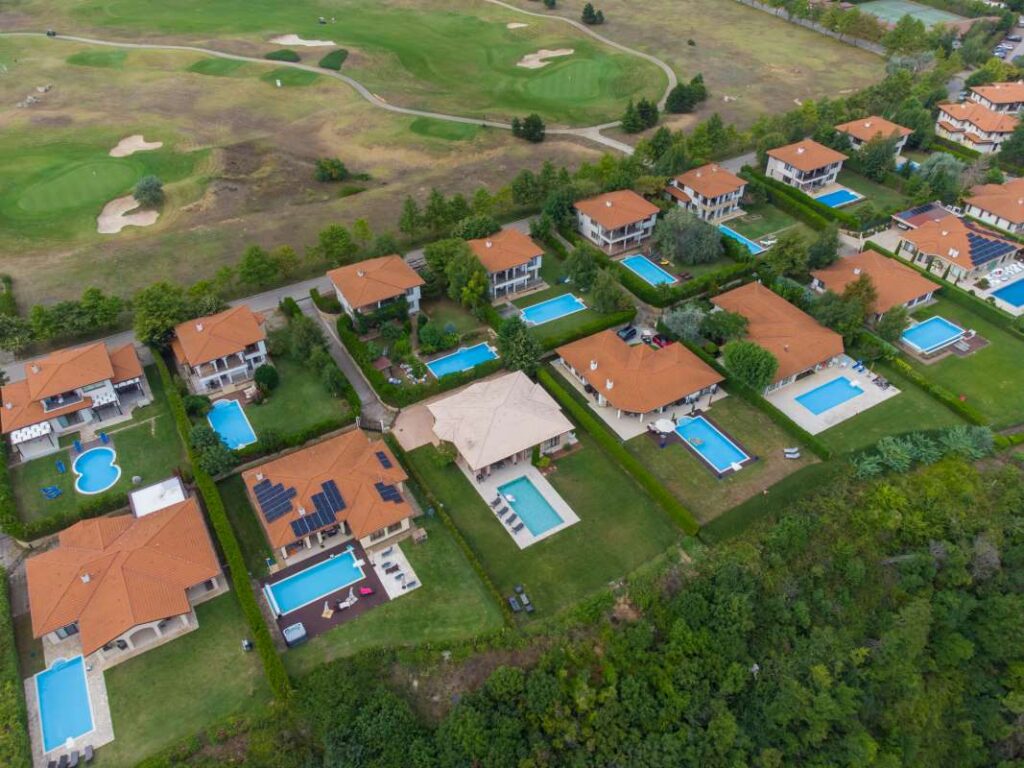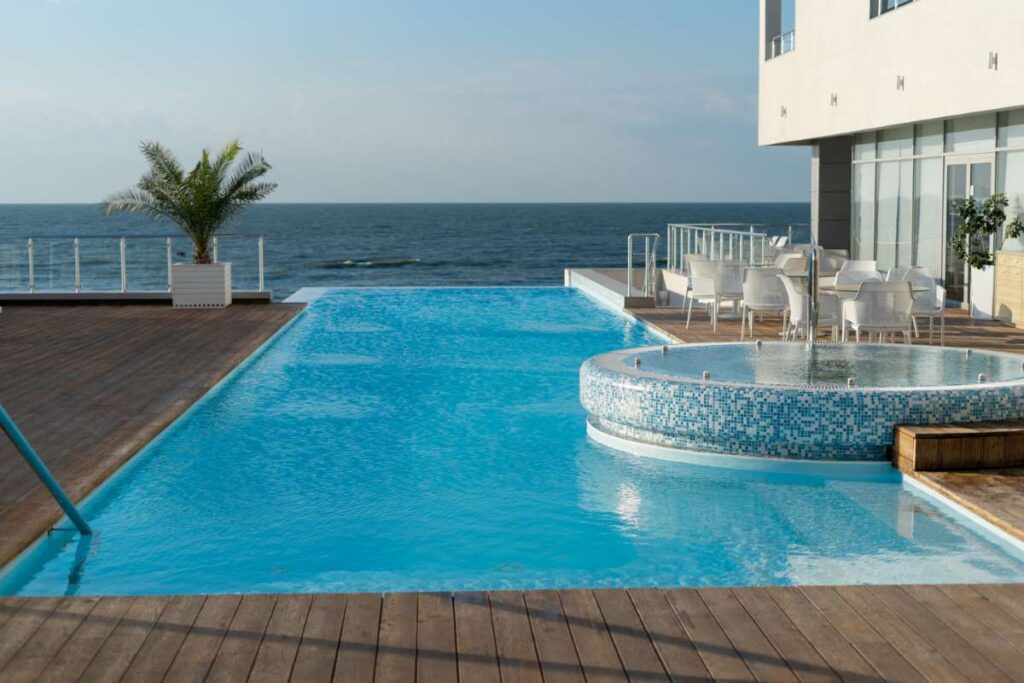Designing Pools That Mimic Natural Water Systems
Discover how to design pools that mimic natural water systems, enhancing aesthetics and promoting environmental sustainability in your backyard.
This blog post explores innovative pool design approaches that reflect natural water systems, combining beauty and ecological responsibility. We’ll discuss the principles of natural swimming pools, the benefits they offer, and valuable tips for creating a serene, sustainable backyard oasis.
Introduction
The allure of water is a powerful force in our lives, often evoking feelings of tranquility and connection to nature. As homeowners seek ways to incorporate more natural elements into their outdoor spaces, designing pools that mimic natural water systems has gained significant popularity. These eco-friendly pools not only provide a stunning visual impact but also promote biodiversity, reduce chemical usage, and create a harmonious environment for both people and wildlife. In this article, we will delve into the principles behind natural swimming pools, explore their benefits, and provide practical tips for creating a stunning naturalized pool in your backyard.
The Principles of Natural Swimming Pools
Natural swimming pools (NSPs) are designed to replicate the functions of a natural body of water, using biological filtration methods to keep the water clean and clear. Here are some key principles guiding the design of these pools:- Plant Filtration Systems: Instead of relying on harsh chemicals, NSPs utilize a variety of aquatic plants to filter and purify the water. These plants absorb nutrients, thereby preventing algae growth while providing habitats for aquatic life.- Regeneration Zones: A typical NSP features two main zones: the swimming area and the regeneration area. The regeneration area is home to filtration plants, which contribute to the pool’s ecosystem and help maintain water quality by breaking down organic waste.- Natural Material Selection: The materials used in constructing a natural pool are often sourced from the surrounding environment. Stone, gravel, and natural clay contribute to the organic feel, ensuring the pool blends seamlessly into the landscape.- Wildlife-Friendly Design: Incorporating features like shallow areas, native plants, and rocks fosters a welcoming habitat for frogs, dragonflies, and other beneficial wildlife, enhancing the pool’s ecological value.By embracing these principles, homeowners can create an inviting, beautiful swimming environment that harmonizes with nature.
The Benefits of Natural Pools
Natural swimming pools offer a multitude of benefits that extend beyond aesthetics. Here are some compelling reasons to consider this innovative approach for your next backyard project:- Reduced Chemical Usage: Traditional pools often rely on chlorine and other chemicals to maintain water clarity and safety. In contrast, natural pools utilize biological processes that eliminate the need for synthetic chemicals, resulting in cleaner, safer water for swimmers.- Enhanced Biodiversity: NSPs promote a diverse ecosystem, attracting a variety of plants and aquatic life. This not only enhances the beauty of the pool but also contributes to local biodiversity, positively impacting the broader environment.- Lower Maintenance Costs: While the initial setup for a natural pool may be higher than traditional pools, the ongoing maintenance costs are usually lower. With no need for chemical treatments and a self-sustaining ecosystem, homeowners can save money long-term.- Natural Aesthetics: The organic look of natural swimming pools provides a serene atmosphere that traditional pools often lack. Homeowners can enjoy the beauty of a natural water body without sacrificing the comforts of a swimming pool.- Health Benefits: Natural pools provide a chemical-free swimming experience, reducing the likelihood of skin irritation and respiratory issues often associated with chlorinated water.- Sustainable Landscaping: By incorporating native plants and local materials, NSPs align with sustainable landscaping practices, minimizing the carbon footprint associated with transporting materials and maintaining water quality.Embracing these benefits can transform your outdoor space into a personal oasis that not only beautifies your property but also contributes to environmental sustainability.
Key Elements to Consider When Designing Your Natural Pool
When embarking on the journey of designing a natural swimming pool, several key elements should be considered to ensure a successful outcome:- Size and Shape: The size and shape of your pool should be tailored to your space and intended use. Irregular shapes are often more visually appealing and can mimic the natural contours of a pond.- Location and Sunlight: Positioning your pool in an area that receives adequate sunlight is crucial for plant growth and water temperature regulation. A location with morning sun and afternoon shade is often ideal.- Water Source: Consider how you will fill and maintain your pool’s water level. Natural springs or rainwater collection systems can be sustainable options for filling your pool.- Plant Selection: Choose a diverse range of native aquatic plants that thrive in your climate. This will not only enhance aesthetics but also ensure a healthy ecosystem. Species like water lilies, cattails, and duckweed are popular choices.- Wildlife Considerations: Incorporate features that attract beneficial wildlife while keeping a balance between human enjoyment and ecological health. Shallow edges, rocks, and logs can provide habitats for frogs and other creatures.- Maintenance Plan: While natural pools require less maintenance than traditional ones, they still need regular care. Develop a maintenance plan that includes monitoring plant health, water levels, and overall pool condition.- Local Regulations: Before you begin, check with local authorities regarding any regulations affecting pool design or water use. Compliance with local laws will prevent future complications.By carefully considering these elements, you can create a beautiful and functional natural swimming pool that enhances your outdoor living experience.
Best Practices for Maintaining a Natural Pool
Maintaining a natural swimming pool requires a different approach than conventional pools. Here are some best practices to keep your pool clean and thriving:- Regular Plant Management: Monitor the health of your aquatic plants and remove any dead or decaying matter to prevent nutrient buildup that could lead to algae growth. Prune and divide plants as needed to maintain balance.- Water Quality Monitoring: Regularly test the water quality to ensure optimal conditions for both swimmers and aquatic life. While natural pools require fewer chemicals, it’s essential to monitor parameters like pH, temperature, and nutrient levels.- Debris Removal: Remove leaves, twigs, and other debris from the water surface to maintain clear visibility and prevent algae blooms. A skimmer net can be an effective tool for this task.- Scheduled Cleanings: Schedule regular cleanings of the regeneration area to ensure efficient plant filtration. This may involve removing excess sediment or organic matter that may accumulate over time.- Wildlife Observation: Keep an eye on the wildlife that frequents your pool. Encourage beneficial insects and discourage pests by creating a balanced ecosystem. – Seasonal Adjustments: Prepare your pool for seasonal changes. In colder climates, consider how you will care for your pool during winter months, such as covering plants or managing ice formation.Implementing these maintenance practices will help ensure the longevity and beauty of your natural pool, providing a welcoming space for relaxation and recreation.
Conclusion
Designing pools that mimic natural water systems offers an innovative way to enhance outdoor spaces while promoting environmental sustainability. By embracing the principles of natural swimming pools, homeowners can create stunning, eco-friendly oases that provide numerous benefits—from reduced chemical use to enhanced biodiversity. As the demand for sustainable solutions in landscaping continues to grow, natural pools stand out as an appealing option for many.Whether you are an aspiring entrepreneur looking to start your own pool service business or an established pool professional seeking to expand your offerings, understanding the nuances of natural pools can open doors to new opportunities. For those interested in exploring business possibilities in the pool service industry, consider checking out our
Pool Routes For Sale to get started.Now is the perfect time to take action. Start planning your natural swimming pool today, and enjoy the beauty and tranquility of a sustainable water feature right in your backyard. If you have any questions or need assistance, feel free to
Contact Us for more information.



